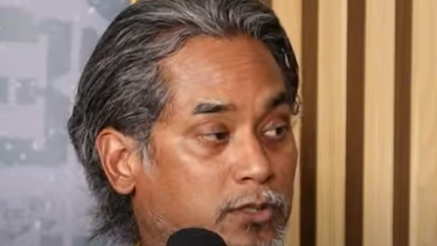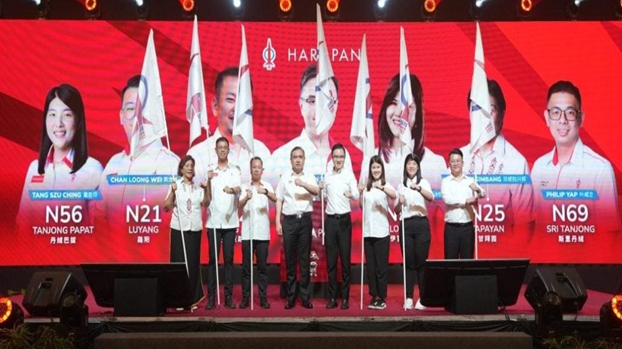
PETALING JAYA: DAP has faced an unprecedented voter swing in the 17th Sabah state election, with its support plummeting from 78% in the previous election to 27%, indicating that DAP is grappling with broader national-level political problems beyond local issues. “When the swing is so drastic, it reflects a major shift in overall sentiment within the Chinese community,’’ said Khairy Jamaluddin in the latest “Keluar Sekejap” podcast session. The former youth chief of Umno and a former Health Minister said that it remains uncertain whether this sentiment will extend to Peninsular Malaysia, but the current political atmosphere points in that direction, citing data provided by former Bangi MP Ong Kian Ming. According to Ong’s calculations, based on voter support in six Chinese-majority constituencies previously held by DAP, the swing was substantial. “The original 78% support has dropped to 27%, and this mainly happened in Chinese-majority constituencies. “ In other words, 51% of voters shifted from supporting DAP to supporting Warisan,” he said. Over the past three years, DAP has had to confront the realities of governing, resulting in significant political compromises — compromises that stand in stark contrast to the party’s earlier image of being “pure, firm, and even somewhat morally untarnished,” said Khairy. “The second point is, when you stand on a very high moral ground, the fall becomes more painful and more enduring,” he said. Khairy also pointed out that part of the backlash stems from what he described as a change in DAP’s attitude after having power. “As Ong Kian Ming said, power can breed complacency and arrogance,” he said. DAP suffered a crushing defeat in the recently concluded Sabah state election, losing all eight state seats the rocket contested.
1 w ago

PETALING JAYA : Malaysians may have to pay more for their greens if the monsoon season continues to bring persistent rainfall, says the Malaysian Federation of Vegetable Farmers Association. Its president Lim Ser Kwee said recent flooding in several countries, including Thailand, Vietnam and Indonesia had begun to push up prices of vegetables. “We import a large variety of vegetables from these three countries and the prices have increased recently due to the recent massive flooding there. “Also affected is the supply from China due to recent cold snaps affecting harvest,” he said when contacted yesterday. On the local front, Lim said while Cameron Highlands and several parts of the country may have escaped the recent floods, cloudy skies had also affected crop yields. “Luckily, Cameron Highlands and states such as Johor, Pahang and Melaka were not hit by heavy downpours and floods. “But the lack of sunshine affected the growing and maturing cycles of vegetables such as sawi bunga (Chinese flowering cabbage) and tomatoes,” he said. He cited the prices of tomatoes, which have increased to over RM5 per kg as compared to RM2 and RM4 per kg previously. It was also reported that prices of some local and imported vegetables had increased by between RM5 and RM8 per kg recently. Lim said the situation would worsen if states such as Johor and Pahang are hit with persistent rainfall during the monsoon. He added that the federation, which has over 6,000 members nationwide, has yet to determine the actual losses. “We have had reports of losses but so far, our members in Penang were not too badly affected.” According to the Malaysian Meteorological Department (MetMalaysia), the northeast monsoon will continue until March next year, bringing five to seven episodes of heavy rain, which could cause floods in low-lying and riverine areas. Last Thursday, MetMalaysia issued a warning for continuous heavy rain and strong winds over a large swathe of Peninsular Malaysia due to the development of the rare tropical storm Senyar in the Strait of Malacca. Cameron Highlands Vegetable Farmers Organisation president Datuk Chai Kok Lim said that vegetable farms in the highlands were not affected by recent floods. “It did not disrupt farming operations here and fortunately, the weather has been sunny over the past few days. “We hope that it remains this way but there is a fear that the monsoon will bring heavy rain again,” he said, adding that there were about 2,000 farmers in Cameron Highlands. Meanwhile, the Agriculture and Food Security Ministry has activated its disaster operation room to assist farmers, planters, livestock owners and fishermen affected by floods in several states. It was activated on Nov 28, following MetMalaysia’s forecasts for the current monsoon season.
1 w ago

SANDAKAN: Chinese voters who supported Parti Warisan emphasised that their decision was not due to poor performance by DAP, nor was it an act of “punishment” against the party. They were not worried that Chinese community interests would suffer if Warisan failed to form the state government. Sin Chew Daily conducted random interviews with several Chinese voters in Sandakan to understand their reasons for supporting Warisan. Some stressed that Sabah’s local culture and circumstances differ significantly from Peninsular Malaysia. In Sabah, no indigenous ruling party would dare openly insult or marginalise the Chinese community—even if they lacked Chinese support—so voters felt reassured that a state government without DAP would not jeopardise their rights, said the voters. Several interviewees noted that in the past, whenever they faced basic utility issues like water and electricity supply, Sandakan member of parliament Vivian Wong and former Tanjong Papat assemblyman Datuk Frankie Poon Ming Fung would promptly step in and respond immediately upon request. Now that the Warisan they voted for has become the opposition, they hope its elected representatives would do the same. However, some expressed regret after casting their ballots. They acknowledged that while DAP is clean and free of corruption, Warisan focused heavily on attacking DAP—ultimately ending up “heading nowhere,” as Warisan was unable to form the state government. They worry this may hinder efforts to resolve day-to-day community issues in their constituencies. For Mr. Jiang, a DAP supporter, the party had been the community’s only hope. But after this defeat, he believes it will take at least 5 to 10 years to clean up the mess—a necessary transitional period for transformation. “Those people,” he said, “only see short-term gains.” Lim, a 41-year-old fitness coach, remarked that even if DAP—contesting only 8 seats—had won every single one, it would still remain a minor party attached to a larger coalition in Sabah, with severely limited capacity to tackle major issues like water, electricity, roads, or the demand for Sabah’s 40% revenue claim. He added that this outcome wasn’t because DAP was incompetent, but because Warisan contested all 73 seats, offering voters a more promising alternative to address these challenges. He explained that his decision to support Warisan over DAP was based on comparisons across multiple dimensions: political ideology, attitude toward the Chinese community, commitment to Sabah’s rights, social justice, integrity, track record in office, and the 40% revenue claim. Key factors included Warisan president Datuk Seri Mohd Shafie Apdal being a moderate, open-minded Muslim indigenous leader; his admiration for Sarawak’s model of governance under the Gabungan Parti Sarawak (GPS) coalition, which has enabled the state to extract significant concessions from the federal government; and the fact that Warisan candidates were not embroiled in any corruption scandals during the campaign. “I’ve always leaned toward supporting Sabah-based local parties—I vote for the party, not the individual,” he said. “But there was one election in the past where I voted for an independent candidate because the quality of the local party’s candidate was an issue,” he […]
1 w ago

KUDAT: Datuk Ben Chong Chen Bin, the only Chinese state assemblyman in the Gabungan Rakyat Sabah (GRS) coalition, has urged the Chinese community to remain calm and not be disheartened. “You still have me in the state government’’ said Chong, 47, who vowed to serve the Sabah Chinese community. “I will continue to assist the Chinese community. You are welcome to contact me for issues affecting the Chinese community,’’ he said. Chief Minister Datuk Hajiji Noor’s governance treats all ethnic groups equally and does not sideline the Chinese community, Chong said, adding that Sabah state government recognises Unified Examination Certificate (UEC) held by Chinese independent school students and these students are also eligible to apply for scholarships. In addition, allocations for non-Muslim groups and Chinese schools in Sabah have been increasing year by year. Chong said he hopes that the Chinese community in the state will support the new Sabah government, so that everyone can work together to develop Sabah and benefit its people. Chong, the former Tanjong Kapor assemblyman, defended his seat in this state election under the GRS, winning a 13-cornered fight with 6,171 votes and a majority of 359. His main opponent was Kudat MP Datuk Verdon Bahanda, who contested as an independent and garnered 5,812 votes. Coming in third was Parti Warisan ’s Oh Soon Hui, who received 4,737 votes. Federation of Chinese Associations Malaysia (Huazong) honorary president Tan Sri T. C. Goh said the current political landscape in Sabah showed that Chinese are in the opposition ( under Parti Warisan). He urged Sabah Chief Minister Hajiji to consider appointing a Chinese assemblyman as the exco to continue serving the Chinese community. Goh, who is also the chairman of Sabah Chinese Assembly Hall, said the organisation would continue to play a bridging role between the Chinese community and the state government.
2 w ago

SANDAKAN: The Chinese voters in Sabah merely wanted to give DAP and PKR a taste of their own medicine and they were not concerned whether Parti Warisan could form the state government. Dr Lee Kuok Tiung, associate professor from the Social Sciences and Humanities Department of Unviersiti Malaysia Sabah, said the Chinese voters had already chosen the candidates they wanted. In a democratic country, one cannot say this was a “waste.” When Chinese voters first began supporting DAP in past years, they too did not expect DAP to be part of the government. In an interview with Sin Chew Daily, Dr Lee pointed out that Gabungan Rakyat Sabah (GRS) also had a Chinese candidate elected— Parti Gagasan Rakyat Sabah (PGRS) candidate Datuk Ben Chong Chen Bin in Tanjung Kapor. After the state government is formed, it is also possible that six additional assemblymen will be appointed, and these appointed seats may include Chinese representatives. Dr Lee believes that the biggest winner in this Sabah state election is Parti Warisan, as even they themselves did not expect to sweep all the urban seats. The biggest losers, meanwhile, are the national-level parties—especially DAP, which was wiped out, and PKR, which won only one seat. However, Dr Lee stressed that one should not assume this defeat means that Sabah DAP will collapse for good. “Sometimes the atmosphere in state elections and national elections differs. For example, in Sarawak, the state-level DAP was nearly wiped out, left with only two seats—but in the general election, they performed exceptionally well,” he said. PAS wins its first seat in East Malaysia Commenting on PAS Sabah chairman Datuk Dr Aliakbar Gulasan’s victory in Karambunai state seat — marking PAS’s first foothold in East Malaysia, Dr Lee believes strongly that Dr Aliakbar Ali won because of his personal character, strong criteria compare to other candidates and his five years of groundwork in the constituency. It is not due to religious expansion. Lee said that to build a good federal–state relationship, the Sabah state government does not necessarily need to be made up entirely of local parties. Although newly-sworn-in Chief Minister and GRS chairman Datuk Seri Hajiji Noor can form a purely local government without Warisan, Dr Lee does not believe the Yang di-Pertua Negeri (state governor) will allow a repeat of the 2018 political drama. He said GRS was unlikely to accept Warisan into the ruling coalition because many Warisan candidates had attacked GRS during the campaign. Therefore, Warisan is expected to become the opposition bloc in the state assembly. He revealed that although the anti-hopping law prevents elected assemblymen from defecting, it does not prevent them from expressing or pledging support to any side. “Hajiji has full authority to decide the direction he thinks is best, but there is certainly no room for Warisan. However, as in any situation, support from Warisan assemblymen is still welcome,” he said. Hajiji has already been sworn in as Chief Minister, with the state governor serving as the “gatekeeper,” and Barisan […]
2 w ago
More